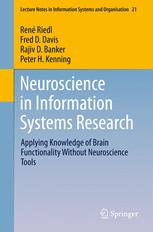

Most ebook files are in PDF format, so you can easily read them using various software such as Foxit Reader or directly on the Google Chrome browser.
Some ebook files are released by publishers in other formats such as .awz, .mobi, .epub, .fb2, etc. You may need to install specific software to read these formats on mobile/PC, such as Calibre.
Please read the tutorial at this link: https://ebookbell.com/faq
We offer FREE conversion to the popular formats you request; however, this may take some time. Therefore, right after payment, please email us, and we will try to provide the service as quickly as possible.
For some exceptional file formats or broken links (if any), please refrain from opening any disputes. Instead, email us first, and we will try to assist within a maximum of 6 hours.
EbookBell Team

4.1
70 reviewsThis book shows how information systems (IS) scholars can effectively apply neuroscience expertise in ways that do not require neuroscience tools. However, the approach described here is intended to complement neuroscience tools, not to supplant them. Written by leading scholars in the field, it presents a review of the empirical literature on NeuroIS and provides a conceptual description of basic brain function from a cognitive neuroscience perspective. Drawing upon the cognitive neuroscience knowledge developed in non-IS contexts, the book enables IS scholars to reinterpret existing behavioral findings, develop new hypotheses and eventually test the hypotheses with non-neuroscience tools. At its core, the book conveys how neuroscience knowledge makes a deeper understanding of IS phenomena possible by connecting the behavioral and neural levels of analysis.